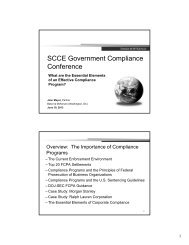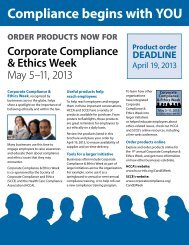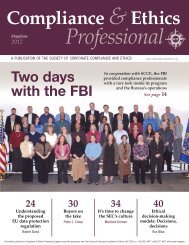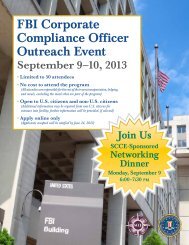Third-party Codes<strong>of</strong> Conduct: Abenchmarking surveyEditor’s Note: Rebecca Walker is a partnerat the law firm <strong>of</strong> Kaplan & WalkerLLP, located in Santa Monica, CA <strong>and</strong>Princeton, NJ. She is a member <strong>of</strong> theAdvisory Board <strong>of</strong> the SCCE <strong>and</strong> is theauthor <strong>of</strong> Conflicts <strong>of</strong> Interest in Business<strong>and</strong> the Pr<strong>of</strong>essions: Law <strong>and</strong> <strong>Compliance</strong>,published by Thomson West. She may becontacted by e-mail atrwalker@kaplanwalker.com.For many organizations, the existence<strong>of</strong> compliance <strong>and</strong> ethicsprograms – <strong>and</strong> the application<strong>of</strong> a company’s code <strong>of</strong> conduct <strong>and</strong>other policies to employees throughthose programs – has become the norm.<strong>Compliance</strong> programs seek to mitigatethe risk <strong>of</strong> misconduct by, in part, defininga company’s st<strong>and</strong>ards <strong>and</strong> requirementsvia policies <strong>and</strong> other documents,<strong>and</strong> educating employees about thosest<strong>and</strong>ards <strong>and</strong> requirements via training,communications, <strong>and</strong> other compliance“tools” that have been developedover the years. Of course, it is not onlyemployees who create risks for organizations.Organizations are also subjectto risks <strong>of</strong> misconduct by virtue <strong>of</strong> theactions <strong>of</strong> agents <strong>and</strong> other third partieswho act on their behalf or partner withthe organization in some way. One needlook no further than recent prosecutionsunder the Foreign Corrupt Practices Actto underst<strong>and</strong> the substantial risks thatcan be created by non-employees <strong>of</strong> anorganization.By Rebecca Walker, Esq.However, the extent to which organizationscan <strong>and</strong> should extend theircompliance <strong>and</strong> ethics programs (orvarious elements <strong>of</strong> them) to third partiescontinues to be the subject <strong>of</strong> somedebate. It is also the subject <strong>of</strong> this, thefirst in a series <strong>of</strong> benchmarking columnsthat will appear in <strong>Compliance</strong> <strong>and</strong> <strong>Ethics</strong>Magazine.By way <strong>of</strong> a side note, benchmarking isparticularly important for compliance <strong>and</strong>ethics pr<strong>of</strong>essionals, because the st<strong>and</strong>ardsin this field are, to a large extent, createdin-house by compliance <strong>and</strong> ethicspractitioners themselves. In other words,government st<strong>and</strong>ards tend to reflect compliance<strong>and</strong> ethics initiatives developedby corporations <strong>and</strong> other organizations,so that the st<strong>and</strong>ards to which organizationsare held are <strong>of</strong>ten a reflection <strong>of</strong>compliance <strong>and</strong> ethics practices withinother organizations. This is reflected inthe Federal Sentencing Guidelines, whichprovide that, in determining what specificactions are necessary to meet the Guidelines’requirements, the government willconsider (among other things) applicableindustry practice. The Guidelines furtherprovide that an organization’s failure toincorporate <strong>and</strong> follow applicable industrypractice will weigh against a finding <strong>of</strong> aneffective compliance <strong>and</strong> ethics program.This makes knowledge about what othersare doing particularly important, hencethe importance <strong>of</strong> compliance <strong>and</strong> ethicsbenchmarking.As mentioned above, this month’s benchmarkingquestions (on the extension <strong>of</strong>codes <strong>of</strong> conduct to third parties) arean important issue for many organizations.Companies continue to grow moredependent on relationships with thirdparties, from joint venture partners toagents to suppliers <strong>of</strong> goods <strong>and</strong> servicesto temporary employees to contractors.Third parties are necessary to do businessfor a variety <strong>of</strong> reasons, <strong>and</strong> they canalso help reduce costs for organizations,as well as surmounting barriers to entry.However, while third-party relationshipsare essential to businesses, theyalso expose organizations to legal <strong>and</strong>reputational risk.In recent years, the government has providedsome incentives for organizationsto extend compliance to third parties.For example, in the 2004 revisions to theU.S. Sentencing Guidelines for Organizations,commentary was added thatprovides that large organizations shouldencourage small organizations (especiallythose that have, or seek to have, a businessrelationship with the large organization)to implement effective compliance<strong>and</strong> ethics programs. 1 The Guidelinesalso discuss third-party compliance in itsdefinition <strong>of</strong> an effective compliance <strong>and</strong>ethics program. In the area <strong>of</strong> training<strong>and</strong> communication, the Guidelines providethat organizations shall periodicallycommunicate their st<strong>and</strong>ards <strong>and</strong> proceduresto employees, directors <strong>and</strong> agents, 2as appropriate, by conducting effectivetraining programs <strong>and</strong> otherwise disseminatinginformation appropriate to theirroles <strong>and</strong> responsibilities. 3 Likewise, inthe area <strong>of</strong> auditing <strong>and</strong> monitoring, theGuidelines provide that an organizationmust take reasonable steps to have <strong>and</strong>publicize a system, which may includemechanisms that allow for anonymityor confidentiality, whereby the organiza-April 200928<strong>Society</strong> <strong>of</strong> <strong>Corporate</strong> <strong>Compliance</strong> <strong>and</strong> <strong>Ethics</strong> • +1 952 933 4977 or 888 277 4977 • www.corporatecompliance.orgThis article, published in <strong>Compliance</strong> & <strong>Ethics</strong> Pr<strong>of</strong>essional, appears here with permission from the <strong>Society</strong> <strong>of</strong> <strong>Corporate</strong> <strong>Compliance</strong> & <strong>Ethics</strong>. Call SCCE at +1 952 277-4977 or 888/277-4977 with all reprint requests.
tion’s employees <strong>and</strong> agents may reportor seek guidance regarding potential oractual criminal conduct without fear <strong>of</strong>retaliation. 4 In addition, recent federal acquisitionregulations create requirementsfor government contractors to, in turn,require certain compliance measures,such as codes <strong>of</strong> conduct, from certaintypes <strong>of</strong> third parties. 5Despite these government incentives <strong>and</strong>m<strong>and</strong>ates <strong>and</strong> the risk mitigation thatcan occur through extension <strong>of</strong> compliancemeasures to third parties, companiesshould nonetheless be cautious in thisendeavor. In particular, companies shouldbe careful not to create compliance <strong>and</strong>ethics st<strong>and</strong>ards that are difficult to monitoror enforce <strong>and</strong> that could potentiallycreate their own risks <strong>of</strong> “associative liability.”Extending compliance <strong>and</strong> ethicsobligations to third parties could lead toreputational harm when a company holdsitself out as requiring others’ compliance,when in fact the company’s ability toensure compliance by third parties maybe limited, a problem which could becompounded if the third-party compliancerequirements more closely link thecompany to the third party in the minds<strong>of</strong> the public (<strong>and</strong> press). There is also arisk that unsatisfied st<strong>and</strong>ards could beused against a company in the context <strong>of</strong>litigation or a government investigation. 6There are, <strong>of</strong> course, numerous ways inwhich to extend compliance <strong>and</strong> ethicsrequirements or expectations to thirdparties, including:n Due diligence regarding potentialbusiness partners’ compliance <strong>and</strong> ethicsprograms.n Incorporating language into contractswith third parties that require compliancewith laws generally <strong>and</strong> withspecific legal prohibitions, such as inthe areas <strong>of</strong> bribery, environmentalcompliance, <strong>and</strong> child labor.n Requiring third parties to report suspectedmisconduct <strong>and</strong> disseminatinginformation to third parties regardingreporting procedures, such as thehelpline.n Communicating company policies tothird parties, such as through letters tothird parties regarding the company’sgifts <strong>and</strong> entertainment policies.n Training third parties on the ethics<strong>and</strong> compliance program or on particularcompany policies or procedures.n Auditing third parties.n Distributing the company’s internalcode or a third-party code to thirdparties.The SurveyIn January 2009, SCCE sent a r<strong>and</strong>omsurvey to compliance pr<strong>of</strong>essionals. Thebenchmarking survey focused on codes <strong>of</strong>conduct. More than 400 people responded.The questions asked <strong>and</strong> responsesreceived include:Does your organization disseminate itsinternal, employee code <strong>of</strong> conduct tothird parties?47% <strong>of</strong> responding companies stated thattheir organization does disseminate itsinternal code to third parties, <strong>and</strong> 53%said that their organization does not.Does your organization requirethird parties to certify to its internal,employee code <strong>of</strong> conduct?26% <strong>of</strong> responding organizations requirethird parties to certify to their codes, <strong>and</strong>74% do not.If yes, what dollar threshold <strong>of</strong> businessbetween your company <strong>and</strong> a third partymust be reached before the third party isrequired to certify to your organization’sinternal, employee code <strong>of</strong> conduct?92% <strong>of</strong> respondents said they have nothreshold (See Figure 1 on page 30).Does your organization have athird-party code <strong>of</strong> conduct that isapplicable to third parties only (<strong>and</strong>not to employees)?17% <strong>of</strong> respondents do; 83% do not.The number <strong>of</strong> companies that disseminatetheir own code to third parties isfewer than half. In addition, only 17%Continued on page 30<strong>Society</strong> <strong>of</strong> <strong>Corporate</strong> <strong>Compliance</strong> <strong>and</strong> <strong>Ethics</strong> • +1 952 933 4977 or 888 277 4977 • www.corporatecompliance.orgApril 200929This article, published in <strong>Compliance</strong> & <strong>Ethics</strong> Pr<strong>of</strong>essional, appears here with permission from the <strong>Society</strong> <strong>of</strong> <strong>Corporate</strong> <strong>Compliance</strong> & <strong>Ethics</strong>. Call SCCE at +1 952 277-4977 or 888/277-4977 with all reprint requests.
















